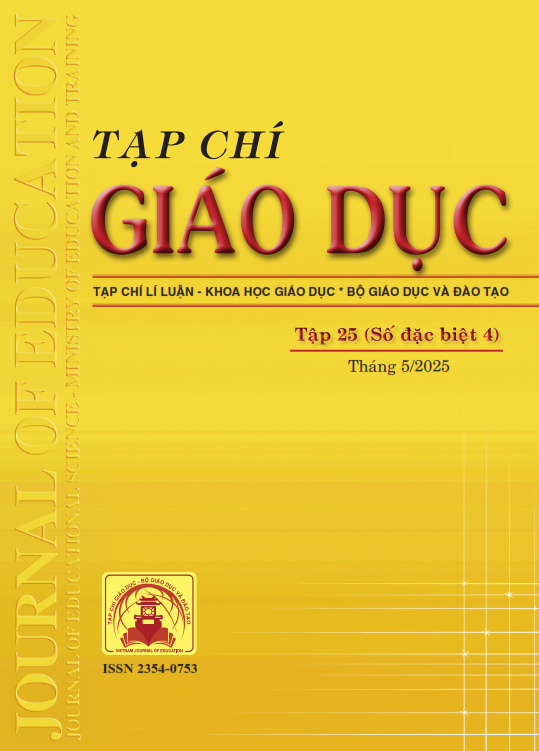Các yếu tố ảnh hưởng tới quản lí dạy học môn tiếng Anh theo chuẩn quốc tế ở các trường trung học cơ sở trên địa bàn thành phố Hà Nội
Tóm tắt
These days, English is widely used and plays a significant role in a variety of industries, including commerce, education, and international communication. As a result of globalization, people are now required to use English as a vital communication tool in their daily lives. To increase the efficacy of teaching and learning, it is crucial to identify the elements influencing the administration of English instruction in accordance with international standards. The goal of this study is to examine the current situation and the factors influencing the management of English language teaching in line with international standards at secondary schools. A questionnaire was used to gather research data from 344 teachers and 41 managers working in public secondary schools in Hanoi. The study's findings indicate that twelve variables, each with varying degrees of influence, affect how English instruction is managed. These results will be useful in suggesting ways to efficiently oversee English instruction in accordance with global norms.
Tài liệu tham khảo
Akman, S. (2023). Investigating students’ views regarding the effectiveness of teaching-learning processes developed for 9th grade english course. Kastamonu Eğitim Dergisi, 413-427. https://doi.org/10.24106/kefdergi-2023-0001
Akolom, I., Masibo, E., & Nyongesa, B. (2021). Innovative instructional strategies used in teaching of english subject in public secondary schools in turkana central sub-county. East African Journal of Education Studies, 3(1), 185-198. https://doi.org/10.37284/eajes.3.1.363
Aziz, F., SekhMaulana, T. (2023). Tanduk majeng (madura’s song) as media to improve english skill at paud badruz zaman. The Ellite of Unira, 6(1), 8. https://doi.org/10.53712/ellite.v6i1.1766
Ban Chấp hành Trung ương (2013). Nghị quyết số 29-NQ/TW ngày 04/11/2013 về đổi mới căn bản, toàn diện giáo dục và đào tạo đáp ứng yêu cầu công nghiệp hóa, hiện đại hóa trong điều kiện kinh tế thị trường định hướng xã hội chủ nghĩa và hội nhập quốc tế.
Cameron, A., Galloway, N. (2019). Local thoughts on global ideas: pre- and in-service tesol practitioners’ attitudes to the pedagogical implications of the globalization of English. Relc Journal, 50(1), 149-163. https://doi.org/ 10.1177/0033688218822853
Chakraborty, T., & Bakshi, S. (2016). English language premium: evidence from a policy experiment in india. Economics of Education Review, 50, 1-16. https://doi.org/10.1016/j.econedurev.2015.10.004
Chen, S. (2023). An investigation into the factors influencing secondary school students’ deep learning of english in a dual-line blended teaching model. Frontiers in Education Technology, 6(2), p115. https://doi.org/10.22158/fet.v6n2p115
Chhetri, D. (2023). Role of English language for business activities at the present era of global marketing. Medha, 6(1), 25-33. https://doi.org/10.3126/medha.v6i1.63954
Dolgenko, A., Косырева, М., & Bogoslovskaya, V. (2023). English language: the last bastion of globalization. Theory and Practice in Language Studies, 13(7), 1632-1637. https://doi.org/10.17507/tpls.1307.04
Fajriah, Y., Suminar, A., Setiawati, P., & Nurjamin, L. (2019). How is english language policy translated to classroom practice? (a case study in an Indonesia primary school). https://doi.org/10.4108/eai.13-2-2019.2286089
Krashen, S. (1985). The Input Hypothesis: Issues and Implications
Lavy, V. (2009). Do differences in schools' instruction time explain international achievement gaps in math, reading, and science?. Education Economics, 17(1), 97-124.
Leithwood, K., Jantzi, D. (2005). A review of research on school leadership and student outcomes. The Educational Leadership Review, 6(3), 3-14.
Matsuda, A., Friedrich, P. (2011). English as an international language: a curriculum blueprint. World Englishes, 30(3), 332-344. https://doi.org/10.1111/j.1467-971x.2011.01717.x
Nishanthi, R. (2018). The importance of learning english in today world. International Journal of Trend in Scientific Research and Development, 3(1), 871-874. https://doi.org/10.31142/ijtsrd19061
Nguyễn Thị Mỹ Lộc, Đặng Quốc Bảo, Nguyễn Trọng Hậu, Nguyễn Quốc Trí, Nguyễn Sĩ Thư (2012). Quản lí giáo dục. Một số vấn đề lí luận và thực tiễn. NXB Đại học Quốc gia Hà Nội.
Nguyễn Quốc Hùng (2000). Xây dựng mô hình dạy Tiếng Anh cho người Việt. Tạp chí Đại học và giáo dục chuyên nghiệp, 3, 34-35.
Nguyen, V. T. (2019). The Role of English in Global Education: An Analytical Approach. Journal of Educational Research and Practice, 34(4), 56-70.
Velasco, Y. (2019). The kachruvian connection and English language teaching in the philippines. World Englishes, 38(1-2), 294-302. https://doi.org/10.1111/weng.12374
Vương Hồng Hạnh (2022). Thực trạng các yếu tố ảnh hưởng đến quản lí dạy học môn tiếng Anh cấp trung học cơ sở theo hướng phát triển năng lực học sinh trên địa bàn thành phố Hà Nội. Tạp chí Khoa học giáo dục Việt Nam, 18(S3), 115-121.
Pesty, M. (2022). French teachers of english: are they trained to teach english pronunciation and oral comprehension properly?. Journal of Language Teaching and Research, 13(2), 221-228. https://doi.org/10.17507/jltr.1302.01
Wahyuningsih, S., Afandi, M., Kasriyati, D., & Khoeroni, F. (2023). Barriers to teaching English to non-native English-speaking teachers in indonesian secondary schools: policy recommendations. European Journal of Educational Research, 12(4), 1617-1629. https://doi.org/10.12973/eu-jer.12.4.1617
Đã Xuất bản
Cách trích dẫn
Số
Chuyên mục
Giấy phép

Tác phẩm này được cấp phép theo Ghi nhận tác giả của Creative Commons Giấy phép quốc tế 4.0 .












